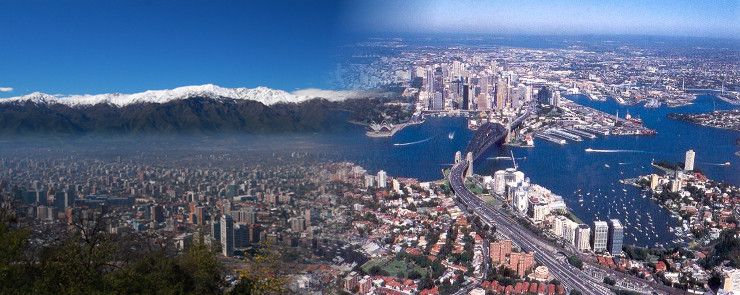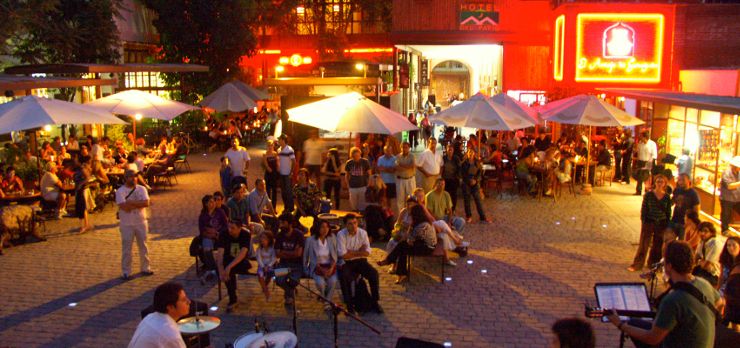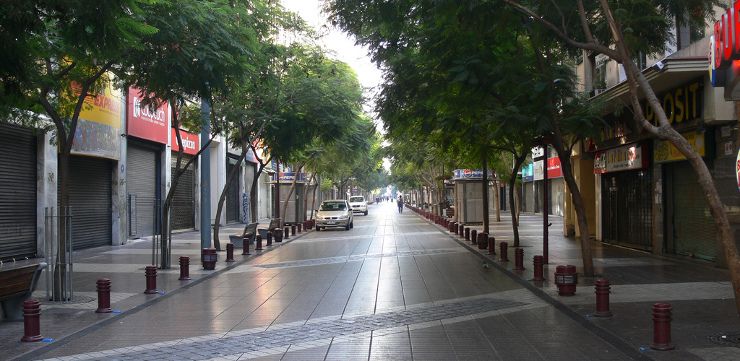Some observations on living in Chile
For almost two years now, I've been living in the grand metropolis of Santiago de Chile. My time here will soon be coming to an end, and before I depart, I'd like to share some of my observations regarding the particularities of life in this city and in this country – principally, as compared with life in my home town, Sydney Australia.
There are plenty of articles round and about the interwebz, aimed more at the practical side of coming to Chile: i.e. tips regarding how to get around; lists of rough prices of goods / services; and crash courses in Chilean Spanish. There are also a number of commentaries on the cultural / social differences between Chile and elsewhere – on the national psyche, and on the political / economic situation.
My endeavour is to avoid this article from falling neatly into either of those categories. That is, I'll be covering some eccentricities of Chile that aren't practical tips as such, although knowing about them may come in handy some day; and I'll be covering some anecdotes that certainly reflect on cultural themes, but that don't pretend to paint the Chilean landscape inside-out, either.
Que disfrutiiy, po.

Image sources: Times Journeys / 2GB.
Fin de mes
Here in Chile, all that is money-related is monthly. You pay everything monthly (your rent, all your bills, all membership fees e.g. gym, school / university fees, health / home / car insurance, etc); and you get paid monthly (if you work here, which I don't). I know that Chile isn't the only country with this modus operandi: I believe it's the European system; and as far as I know, it's the system in various other Latin American countries too.
In Australia – and as far as I know, in most English-speaking countries – there are no set-in-stone rules about the frequency with which you pay things, or with which you get paid. Bills / fees can be weekly, monthly, quarterly, annual… whatever (although rent is generally charged and is talked about as a weekly cost). Your pay cheque can be weekly, fortnightly, monthly, quarterly… equally whatever (although we talk about "how much you earn" annually, even though hardly anyone is paid annually). I guess the "all monthly" system is more consistent, and I guess it makes it easier to calculate and compare costs. However, having grown up with the "whatever" system, "all monthly" seems strange and somewhat amusing to me.
In Chile, although payment due dates can be anytime throughout the month, almost everyone receives their salary at fin de mes (the end of the month). I believe the (rough) rule is: the dosh arrives on the actual last day of the month if it's a regular weekday; or the last regular weekday of the month, if the actual last day is a weekend or public holiday (which is quite often, since Chile has a lot of public holidays – twice as many as Australia!).
This system, combined with the last-minute / impulsive form of living here, has an effect that's amusing, frustrating, and (when you think about it) depressingly predictable. As I like to say (in jest, to the locals): in Chile, it's Christmas time every end-of-month! The shops are packed, the restaurants are overflowing, and the traffic is insane, on the last day and the subsequent few days of each month. For the rest of the month, all is quiet. Especially the week before fin de mes, which is really Struggle Street for Chileans. So extreme is this fin de mes culture, that it's even busy at the petrol stations at this time, because many wait for their pay cheque before going to fill up the tank.
This really surprised me during my first few months in Chile. I used to ask: ¿Qué pasa? ¿Hay algo important hoy? ("What's going on? Is something important happening today?"). To which locals would respond: Es fin de mes! Hoy te pagan! ("It's end-of-month! You get paid today!"). These days, I'm more-or-less getting the hang of the cycle; although I don't think I'll ever really get my head around it. I'm pretty sure that, even if we did all get paid on the same day in Australia (which we don't), we wouldn't all rush straight to the shops in a mad stampede, desperate to spend the lot. But hey, that's how life is around here.
Cuotas
Continuing with the socio-economic theme, and also continuing with the "all-monthly" theme: another Chile-ism that will never cease to amuse and amaze me, is the omnipresent cuotas ("monthly instalments"). Chile has seen a spectacular rise in the use of credit cards, over the last few decades. However, the way these credit cards work is somewhat unique, compared with the usual credit system in Australia and elsewhere.
Any time you make a credit card purchase in Chile, the cashier / shop assistant will, without fail, ask you: ¿cuántas cuotas? ("how many instalments?"). If you're using a foreign credit card, like myself, then you must always answer: sin cuotas ("no instalments"). This is because, even if you wanted to pay for your purchase in chunks over the next 3-24 months (and trust me, you don't), you can't, because this system of "choosing at point of purchase to pay in instalments" only works with local Chilean cards.
Chile's current president, the multi-millionaire Sebastian Piñera, played an important part in bringing the credit card to Chile, during his involvement with the banking industry before entering politics. He's also generally regarded as the inventor of the cuotas system. The ability to choose your monthly instalments at point of sale is now supported by all credit cards, all payment machines, all banks, and all credit-accepting retailers nationwide. The system has even spread to some of Chile's neighbours, including Argentina.
Unfortunately, although it seems like something useful for the consumer, the truth is exactly the opposite: the cuotas system and its offspring, the cuotas national psyche, has resulted in the vast majority of Chileans (particularly the less wealthy among them) being permanently and inescapably mired in debt. What's more, although some of the cuotas offered are interest-free (with the most typical being a no-interest 3-instalment plan), some plans and some cards (most notoriously the "department store bank" cards) charge exhorbitantly high interest, and are riddled with unfair and arcane terms and conditions.
Última hora
Chile's a funny place, because it's so "not Latin America" in certain aspects (e.g. much better infrastructure than most of its neighbours), and yet it's so "spot-on Latin America" in other aspects. The última hora ("last-minute") way of living definitely falls within the latter category.
In Chile, people do not make plans in advance. At least, not for anything social- or family-related. Ask someone in Chile: "what are you doing next weekend?" And their answer will probably be: "I don't know, the weekend hasn't arrived yet… we'll see!" If your friends or family want to get together with you in Chile, don't expect a phone call the week before. Expect a phone call about an hour before.
I'm not just talking about casual meet-ups, either. In Chile, expect to be invited to large birthday parties a few hours before. Expect to know what you're doing for Christmas / New Year a few hours before. And even expect to know if you're going on a trip or not, a few hours before (and if it's a multi-day trip, expect to find a place to stay when you arrive, because Chileans aren't big on making reservations).
This is in stark contrast to Australia, where most people have a calendar to organise their personal life (something extremely uncommon in Chile), and where most peoples' evenings and weekends are booked out at least a week or two in advance. Ask someone in Sydney what their schedule is for the next week. The answer will probably be: "well, I've got yoga tomorrow evening, I'm catching up with Steve for lunch on Wednesday, big party with some old friends on Friday night, beach picnic on Saturday afternoon, and a fancy dress party in the city on Saturday night." Plus, ask them what they're doing in two months' time, and they'll probably already have booked: "6 nights staying in a bungalow near Batemans Bay".
The última hora system is both refreshing and frustrating, for a planned-ahead foreigner like myself. It makes you realise just how regimented, inflexible, and lacking in spontenaeity life can be in your home country. But, then again, it also makes you tear your hair out, when people make zero effort to co-ordinate different events and to avoid clashes. Plus, it makes for many an awkward silence when the folks back home ask the question that everybody asks back home, but that nobody asks around here: "so, what are you doing next weekend?" Depends which way the wind blows.
Sit down
In Chile (and elsewhere nearby, e.g. Argentina), you do not eat or drink while standing. In most bars in Chile, everyone is sitting down. In fact, in general there is little or no "bar" area, in bars around here; it's all tables and chairs. If there are no tables or chairs left, people will go to a different bar, or wait for seats to become vacant before eating / drinking. Same applies in the home, in the park, in the garden, or elsewhere: nobody eats or drinks standing up. Not even beer. Not even nuts. Not even potato chips.
In Australia (and in most other English-speaking countries, as far as I know), most people eat and drink while standing, in a range of different contexts. If you're in a crowded bar or pub, eating / drinking / talking while standing is considered normal. Likewise for a big house party. Same deal if you're in the park and you don't want to sit on the grass. I know it's only a little thing; but it's one of those little things that you only realise is different in other cultures, after you've lived somewhere else.
It's also fairly common to see someone eating their take-away or other food while walking, in Australia. Perhaps some hot chips while ambling along the beach. Perhaps a sandwich for lunch while running (late) to a meeting. Or perhaps some lollies on the way to the bus stop. All stuff you wouldn't blink twice at back in Oz. In Chile, that is simply not done. Doesn't matter if you're in a hurry. It couldn't possibly be such a hurry, that you can't sit down to eat in a civilised fashion. The Chilean system is probably better for your digestion! And they have a point: perhaps the solution isn't to save time by eating and walking, but simply to be in less of a hurry?

Image source: Dondequieroir.
Walled and shuttered
One of the most striking visual differences between the Santiago and Sydney streetscapes, in my opinion, is that walled-up and shuttered-up buildings are far more prevalent in the former than in the latter. Santiago is not a dangerous city, by Latin-American or even by most Western standards; however, it often feels much less secure than it should, particularly at night, because often all you can see around you is chains, padlocks, and sturdy grilles. Chileans tend to shut up shop Fort Knox-style.
Walk down Santiago's Ahumada shopping strip in the evening, and none of the shopfronts can be seen. No glass, no lit-up signs, no posters. Just grey steel shutters. Walk down Sydney's Pitt St in the evening, and – even though all the shops close earlier than in Santiago – it doesn't feel like a prison, it just feels like a shopping area after-hours.
In Chile, virtually all houses and apartment buildings are walled and gated. Also, particularly ugly in my opinion, schools in Chile are surrounded by high thick walls. For both houses and schools, it doesn't matter if they're upper- or lower-class, nor what part of town they're in: that's just the way they build them around here. In Australia, on the other hand, you can see most houses and gardens from the street as you go past (and walled-in houses are criticised as being owned by "paranoid people"); same with schools, which tend to be open and abundant spaces, seldom delimiting their boundary with anything more than a low mesh fence.
As I said, Santiago isn't a particularly dangerous city, although it's true that robbery is far more common here than in Sydney. The real difference, in my opinion, is that Chileans simply don't feel safe unless they're walled in and shuttered up. Plus, it's something of a vicious cycle: if everyone else in the city has a wall around their house, and you don't, then chances are that your house will be targeted, not because it's actually easier to break into than the house next door (which has a wall that can be easily jumped over anyway), but simply because it looks more exposed. Anyway, I will continue to argue to Chileans that their country (and the world in general) would be better with less walls and less barriers; and, no doubt, they will continue to stare back at me in bewilderment.

Image source: eszsara (Flickriver).
In summary
So, there you have it: a few of my random observations about life in Santiago, Chile. I hope you've found them educational and entertaining. Overall, I've enjoyed my time in this city; and while I'm sometimes critical of and poke fun at Santiago's (and Chile's) peculiarities, I'm also pretty sure I'll miss then when I'm gone. If you have any conclusions of your own regarding life in this big city, feel free to share them below.